
How to Save Electricity Bills For Home
Saving electricity at home not only reduces your energy bills but also helps decrease your carbon footprint. By adopting simple habits such as turning off unused lights, unplugging idle appliances, and using energy-efficient bulbs, you can make a significant difference. More involved actions like installing energy-efficient appliances and sealing air leaks can further enhance your home’s energy efficiency. These practices will not only save you money but also contribute to a healthier environment.
How to Save Electricity Bills For Home
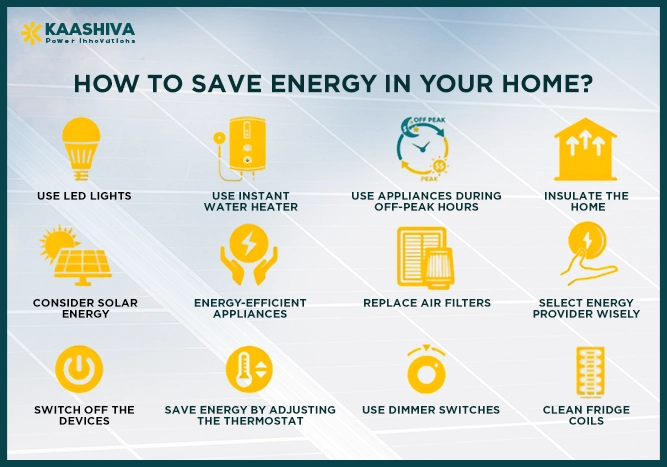
Saving electricity at home can be achieved through a few straightforward steps. Start by replacing incandescent bulbs with energy-efficient LED bulbs, which consume much less power. Always switch off appliances when not in use and unplug them to prevent energy wastage. Investing in energy-saving appliances, such as dishwashers, washing machines, and refrigerators, can further reduce your consumption. Additionally, maximize the use of natural light and minimize reliance on air conditioning and heating systems. These small changes can lead to significant savings on your electricity bills while also benefiting the environment.
Why Does Energy Efficiency at Home Matter?
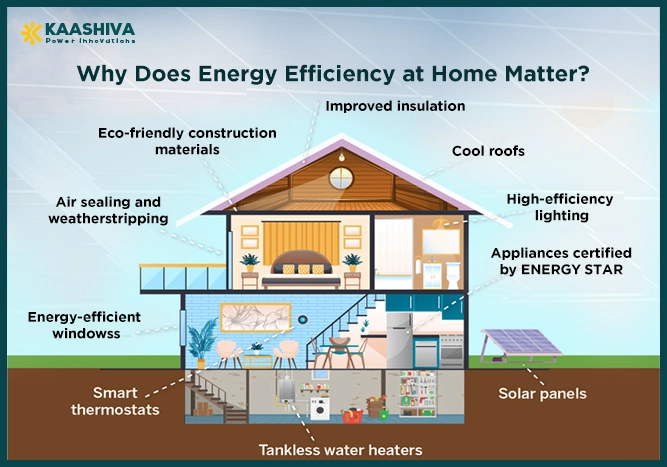
Energy efficiency at home is essential for several reasons. It helps reduce electricity bills, lessens environmental impact, and enhances home comfort. Using energy-efficient appliances and techniques lowers resource consumption, which in turn decreases greenhouse gas emissions. This contributes to better air quality in your home and reduces reliance on fossil fuels, aiding the transition to renewable energy sources. Ultimately, energy efficiency is vital for saving money, protecting the environment, and making your home a more comfortable place to live.
Use a Solar Panel System to Reduce Electricity Bills
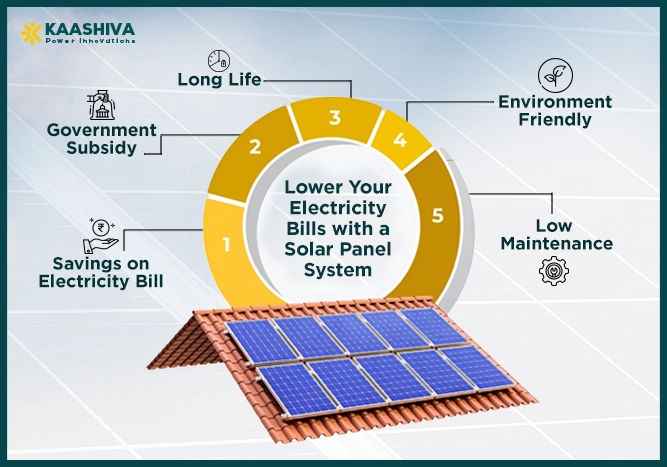
Installing a solar panel system at home is a powerful way to cut down on electricity costs. Solar energy is renewable and clean, making it an ideal choice for home power. Though the initial investment may be substantial, the long-term savings are considerable. With a well-designed system, not only can you reduce your electricity bills, but you might also generate income by selling excess energy back to the grid. Solar panels provide a consistent power source and can be used to run everything from lights to air conditioning.
Electricity is Cleaner, But Saving Energy Still Helps the Environment
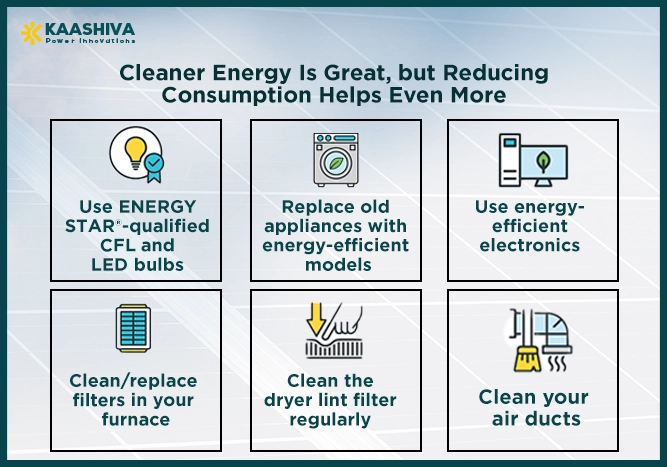
While modern electricity generation is cleaner than in the past, saving energy remains crucial for environmental conservation. By reducing electricity use, you decrease the demand for energy, thereby lowering the release of pollutants into the atmosphere. This helps maintain clean air and lessens the environmental impact of energy production. Additionally, reducing energy consumption conserves natural resources like coal and gas. Energy-saving habits help mitigate climate change and contribute to a healthier environment for future generations.
Electricity Rates Across Different States in India
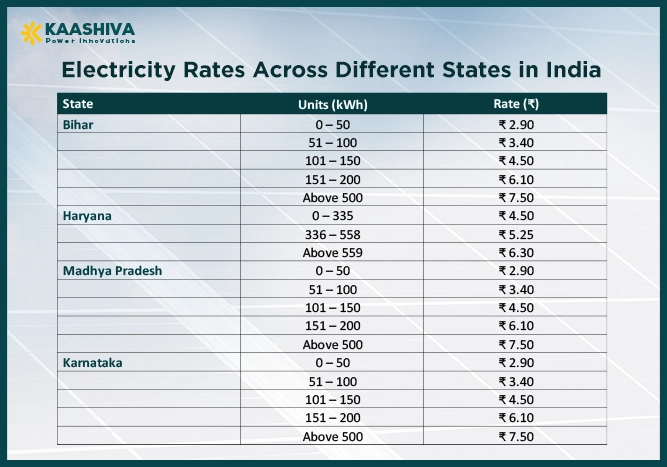
Electricity rates vary significantly across different states in India. Here’s a brief overview of the rates in a few states:
- Bihar:
0 – 50 units: ₹ 2.90
51 – 100 units: ₹ 3.40
101 – 150 units: ₹ 4.50
151 – 200 units: ₹ 6.10
Above 500 units: ₹ 7.50 - Haryana:
0 – 335 units: ₹ 4.50
336 – 558 units: ₹ 5.25
Above 559 Units: ₹ 6.30 - Madhya Pradesh:
0 – 50 units: ₹ 2.90
51 – 100 units: ₹ 3.40
101 – 150 units: ₹ 4.50
151 – 200 units: ₹ 6.10
Above 500 units: ₹ 7.50 - Karnataka:
0 – 50 units: ₹ 2.90
51 – 100 units: ₹ 3.40
101 – 150 units: ₹ 4.50
151 – 200 units: ₹ 6.10
Above 500 units: ₹ 7.50
By understanding these rates, you can better manage your electricity consumption and reduce your bills smartly.
17 Electricity Saving Tips for the Home
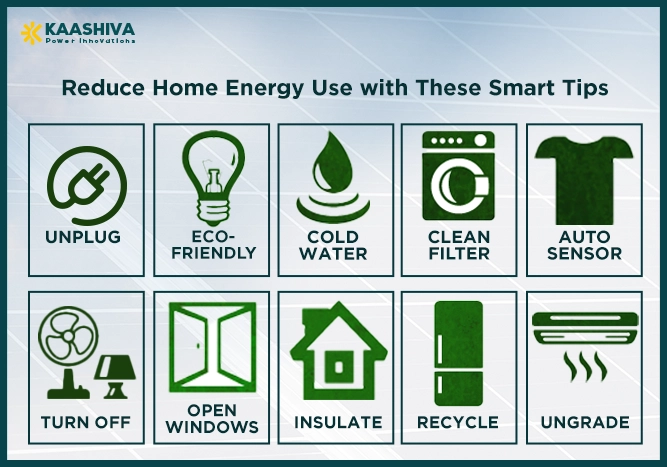
- Watch out for energy-draining appliances: Replace old, inefficient appliances to reduce energy consumption.
- Switch off appliances when not in use: Simple habits like turning off lights can save significant energy.
- Use smart power strips: These can automatically cut off power to devices that are not in use.
- Cold wash when possible: Washing clothes in cold water saves energy and preserves fabric quality.
- Dry clothes and dishes naturally: Air-drying is an energy-free way to reduce utility costs.
- Upgrade to energy-efficient systems: Investing in energy-efficient appliances can lead to long-term savings.
- Install a programmable thermostat: Customize your heating and cooling schedule for maximum efficiency.
- Adjust light use: Switch to energy-efficient bulbs and utilize natural light.
- Install energy-efficient light bulbs: These last longer and use significantly less energy.
- Lower refrigerator temperature: A small reduction can lead to substantial energy savings.
- Install ceiling fans: They can reduce your reliance on energy-intensive air conditioning.
- Maintain insulation: Proper insulation reduces the need for heating and cooling.
- Defrost your freezer monthly: This helps it run more efficiently and saves energy.
- Keep up with maintenance: Regularly servicing appliances ensures they operate efficiently.
- Use power strips: They help manage electricity usage by allowing you to easily turn off multiple devices at once.
- Adjust the water heater temperature: Lowering the temperature reduces energy consumption.
- Take shorter showers: This saves water and reduces the energy needed to heat it.
Conclusion
Saving electricity is crucial for reducing environmental impact and preserving natural resources. Simple actions like unplugging appliances, using energy-efficient bulbs, and adjusting light usage can significantly cut down your energy consumption. Investing in renewable energy sources such as solar power can further reduce your reliance on traditional electricity. By taking these steps, you contribute to a more sustainable future while also enjoying lower energy bills.
3 Comments

John Doe 01 Jan 2045
Diam amet duo labore stet elitr invidunt ea clita ipsum voluptua, tempor labore accusam ipsum et no at. Kasd diam tempor rebum magna dolores sed eirmod

John Doe 01 Jan 2045
Diam amet duo labore stet elitr invidunt ea clita ipsum voluptua, tempor labore accusam ipsum et no at. Kasd diam tempor rebum magna dolores sed eirmod

John Doe 01 Jan 2045
Diam amet duo labore stet elitr invidunt ea clita ipsum voluptua, tempor labore accusam ipsum et no at. Kasd diam tempor rebum magna dolores sed eirmod



